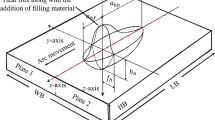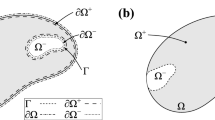Abstract
A numerical procedure for analyzing the temperature distribution in a hollow axisymmetric cylinder, made of functionally gradient material (FGM), was investigated. Based on the thermal elasticity theory and the arbitrary difference precise integration (ADPI) method, temperature distribution through the FGM cylinder in the ring section under a transient-state temperature field was developed and presented. A genetic algorithm (GA) was applied to the thermal stress optimal design of an FGM hollow cylinder, and as a result, the minimum thermal stress distribution in the FGM cylinder was obtained. A corresponding numerical procedure regarding to a ceramic-metal FGM cylinder was performed, and the computational results were discussed.
Similar content being viewed by others
References
M. Koizumi, FGM activities in Japan, Compos. Part B, 28(1997), No.1–2, p.1.
A. Mortensen and S. Suresh, Functionally graded metals and metal-ceramic composites: Part 1 Processing, Int. Mater. Rev., 1995, 40(6): p.239.
Y.T. Li, Study on functional graded material and its application, Met. Funct. Mater., 7(2000), No.4, p.16.
X.H. Zhu and Z.Y. Meng, Functionally gradient materials: current status and future directions, Funct. Mater., 29(1998), No.2, p.121.
C.O. Horgan and A.M. Chan, The pressurized hollow cylinder or disk problem for functionally graded isotropic linearly elastic materials, J. Elast., 55(1999), p.43.
T. Hirano, J. Teraki, and T. Yamada, On the design of functionally gradient materials, [in] Proceedings of the First International Symposium on Functionally Gradient Materials, Sendai, 1990, p.5.
N. Noda, Thermal stresses in functionally graded materials, J. Therm. Stresses, 22(1999), No.4, p.477.
B.L. Wang, J.C. Han, and S.Y. Du, Crack problems for functionally graded materials under transient thermal loading, J. Therm. Stresses, 23(2000), No.2, p.143.
Y. Tanigawa, T. Akai, R. Kawamura, and N. Oka, Transient heat conduction and thermal stress problems of a non-homogeneous plate with temperature-dependent material properties, J. Therm. Stresses, 19(1996), No.1, p.77.
X.D. Zhang, D.Q. Liu, and C.C. Ge, Mathematical model for axial symmetrical FGM, [in] Proceedings of the 4th International Symposium on Functionally Gradient Materials, Tokyo, 1996, p.35.
M. Zhang and X.D. Zhang, Precise integration method for solving wave equation and its numerical stability, J. Univ. Pet. China, 28(2004), No.6, p.129.
M. Zhang and X.D. Zhang, The precise integration method for 2d solving wave equation absorb boundary question, Numer. Math. A J. Chin. Univ., 27(2005), Suppl.1, p.132.
Q.S. Zhong, X.G. Wang, M.L. Tang, and M. Liu, On the arbitrary difference precise integration method and its numerical stability, Appl. Math. Mech., 20(1999), No.3, p.256.
H. Hadj Abdallah, L. Krichen, and A. Ouali, Genetic algorithms for optimal reactive power compensation of a power system with wind generators based on artificial neural networks, J. Electr. Syst., 3–1(2007), p.1.
X.D. Zhang, Z.B. Tang, and C.C. Ge, The genetic algorithm for the thermal stresses optimum design of functionally gradient material plate, J. Univ. Sci. Technol. Beijing, 6(1999), No.3, p.224.
Author information
Authors and Affiliations
Corresponding author
Rights and permissions
About this article
Cite this article
Zhang, Xd., Hong, Yl. & Li, Ah. Optimization of axial symmetrical FGM under the transient-state temperate field. Int J Miner Metall Mater 19, 59–63 (2012). https://doi.org/10.1007/s12613-012-0515-4
Received:
Revised:
Accepted:
Published:
Issue Date:
DOI: https://doi.org/10.1007/s12613-012-0515-4




